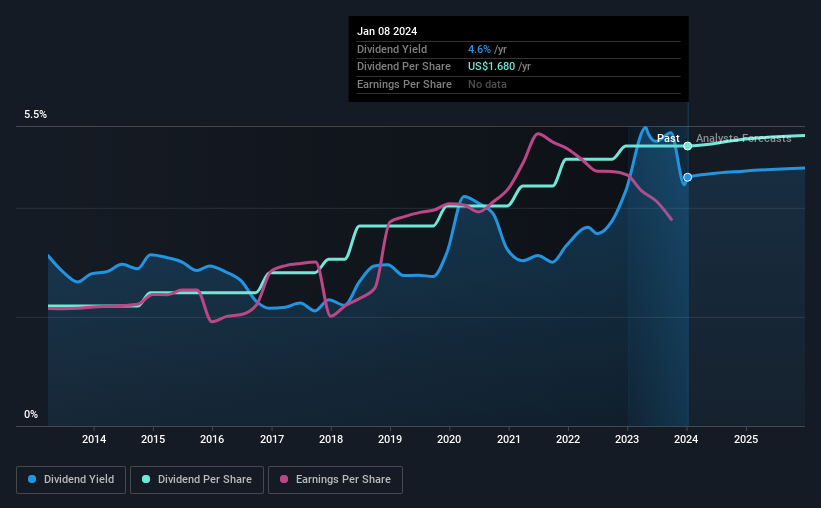Camden National (NASDAQ:CAC) Will Pay A Dividend Of $0.42
Camden National Corporation (NASDAQ:CAC) has announced that it will pay a dividend of $0.42 per share on the 31st of January. Based on this payment, the dividend yield on the company's stock will be 4.6%, which is an attractive boost to shareholder returns.
While the dividend yield is important for income investors, it is also important to consider any large share price moves, as this will generally outweigh any gains from distributions. Investors will be pleased to see that Camden National's stock price has increased by 32% in the last 3 months, which is good for shareholders and can also explain a decrease in the dividend yield.
See our latest analysis for Camden National
Camden National's Earnings Will Easily Cover The Distributions
If the payments aren't sustainable, a high yield for a few years won't matter that much.
Having distributed dividends for at least 10 years, Camden National has a long history of paying out a part of its earnings to shareholders. Based on Camden National's last earnings report, the payout ratio is at a decent 49%, meaning that the company is able to pay out its dividend with a bit of room to spare.
EPS is set to fall by 11.1% over the next 3 years. Fortunately, analysts forecast the future payout ratio to be 56% over the same time horizon, which is in the range that makes us comfortable with the sustainability of the dividend.
Camden National Has A Solid Track Record
The company has a sustained record of paying dividends with very little fluctuation. Since 2014, the dividend has gone from $0.72 total annually to $1.68. This implies that the company grew its distributions at a yearly rate of about 8.8% over that duration. Dividends have grown at a reasonable rate over this period, and without any major cuts in the payment over time, we think this is an attractive combination as it provides a nice boost to shareholder returns.
Camden National Could Grow Its Dividend
The company's investors will be pleased to have been receiving dividend income for some time. We are encouraged to see that Camden National has grown earnings per share at 8.4% per year over the past five years. Earnings are on the uptrend, and it is only paying a small portion of those earnings to shareholders.
Camden National Looks Like A Great Dividend Stock
Overall, we like to see the dividend staying consistent, and we think Camden National might even raise payments in the future. The company is generating plenty of cash, and the earnings also quite easily cover the distributions. We should point out that the earnings are expected to fall over the next 12 months, which won't be a problem if this doesn't become a trend, but could cause some turbulence in the next year. Taking this all into consideration, this looks like it could be a good dividend opportunity.
Market movements attest to how highly valued a consistent dividend policy is compared to one which is more unpredictable. At the same time, there are other factors our readers should be conscious of before pouring capital into a stock. For instance, we've picked out 1 warning sign for Camden National that investors should take into consideration. If you are a dividend investor, you might also want to look at our curated list of high yield dividend stocks.
Have feedback on this article? Concerned about the content? Get in touch with us directly. Alternatively, email editorial-team (at) simplywallst.com.
This article by Simply Wall St is general in nature. We provide commentary based on historical data and analyst forecasts only using an unbiased methodology and our articles are not intended to be financial advice. It does not constitute a recommendation to buy or sell any stock, and does not take account of your objectives, or your financial situation. We aim to bring you long-term focused analysis driven by fundamental data. Note that our analysis may not factor in the latest price-sensitive company announcements or qualitative material. Simply Wall St has no position in any stocks mentioned.

